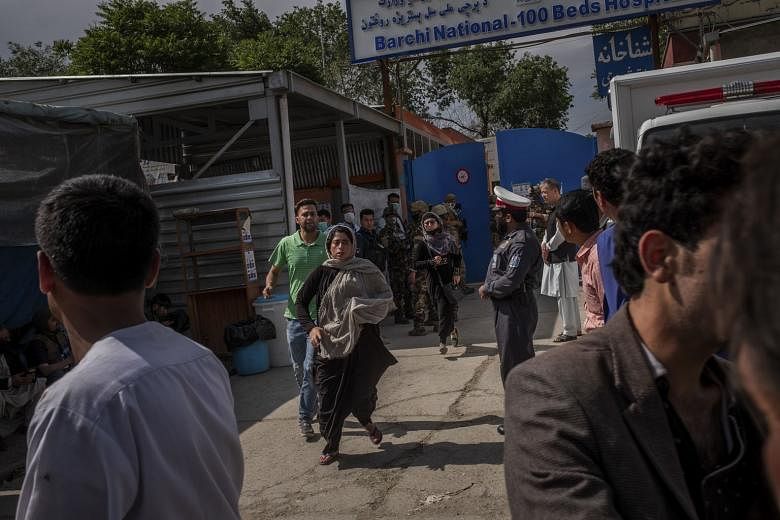WASHINGTON • American officials are scrambling to keep Afghanistan's tenuous peace process from falling apart, blaming the Islamic State in Iraq and Syria (ISIS) for horrific attacks that have recently killed dozens of people and further inflamed tensions between the Taleban and the government in Kabul.
The two brutal attacks last week laid bare major weaknesses of the US-Taleban troop withdrawal pact: Nothing in it obliges the Taleban to prevent such massacres and the Afghan government's ability to thwart them will only wane as United States troops pull out.
The pact is ultimately supposed to promote peace between the Afghan government and the Taleban, which denied carrying out a Kabul attack in which three gunmen disguised as police killed 24 people, including two babies, at a Kabul maternity ward, and a suicide bombing in eastern Afghanistan that killed 32.
The key provisions of the Feb 29 agreement - to which the Afghan government was not a party - involved a US commitment to reduce its military footprint in Afghanistan to 8,600 by mid-July and, conditions permitting, to zero by May next year.
In return, the Taleban promised, among other things, not to allow "its members, other individuals or groups, including Al-Qaeda, to use the soil of Afghanistan to threaten the security of the United States and its allies".
Technically, Afghanistan is not formally an ally of the US because they do not have a mutual defence treaty.
And the agreement says nothing about attacks on Afghan civilians such as the two that occurred last Tuesday.
"There's nothing in our peace agreement with the Taleban that would preclude them from killing Afghans," Democratic US Representative Tom Malinowski, a former top State Department official for human rights, told Reuters.
"And of course the moment we're out, there's no practical deterrence either," he added.
US Special Representative Zalmay Khalilzad, architect of the deal advocated by Republican President Donald Trump, acknowledged it did not bar attacks on Afghans and said it would be best if both sides began talks and efforts to combat such attacks while US forces are still there.
"The agreement does not specifically (call) for them not to attack Afghan forces," Mr Khalilzad told reporters on Friday.
However, he said the Taleban committed to reducing violence and that a ceasefire would be among the first topics in intra-Afghan negotiations.
"A political solution, a peace agreement among Afghans, is the only realistic option at the present time," Mr Khalilzad told reporters during a State Department briefing.
He blamed ISIS' Afghan wing for stoking the horrific attacks, as the terrorist group seeks to inflame tensions.
"There are forces such as ISIS that don't see peace in Afghanistan in their interests and are trying to increase violence, to undermine the prospect for peace," Mr Khalilzad said.
"We're urging both sides not to fall into that trap."
The violence, and the accusations arising from it, has pushed both the Taleban and Afghan government back into their respective corners.
President Ashraf Ghani of Afghanistan has vowed to resume military offensives against the Taleban, while the Taleban - which ramped up its attacks soon after signing the peace deal with the US - has accused the Kabul government of falsely using the recent attacks as an excuse to abandon the peace agreement.
A Western diplomat based in Kabul suggested the Taleban got the better of the deal with the US.
"The agreement between the US and the Taleban is full of holes. While it clearly lays down the US/ Nato withdrawal plan, it expects very little from the Taleban side," the diplomat said.
"It's a nebulous deal where one side makes its intentions clear but the other side makes no serious commitment."
NYTIMES, REUTERS

